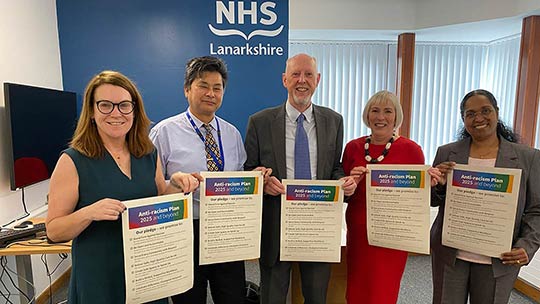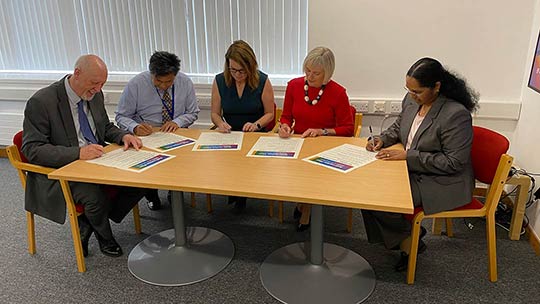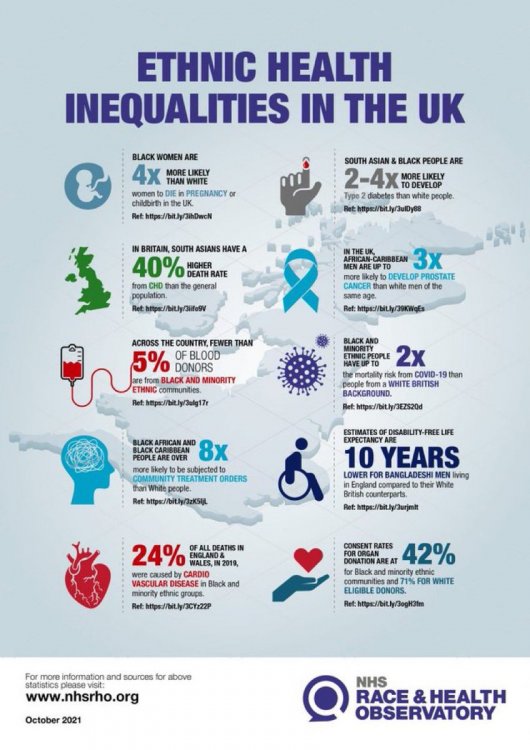NHS Lanarkshire
Anti-racism plan
NHS Lanarkshire has launched a new initiative to take an active stance against racism.
Our anti-racism plan aims to provide a safe and non-discriminatory environment for staff and patients.
Being anti-racist is the active commitment to recognise, challenge and dismantle racism through deliberate actions, not just words. We all need to work together to achieve this.
The plan has seven key goals:
- Support NHS Lanarkshire’s workforce
- Understand the local population
- Help services to seek out inequalities and ways to tackle them
- Develop a culture that supports our staff and patients to be actively anti-racist
- Listen to communities and the voices of lived experience
- Strong leadership to hold NHS Lanarkshire accountable
- Review and evaluate the plan
Our pledge – we promise to:
Stand Firm Against Racism
We take racism seriously. We will challenge it wherever it exists and will actively work to dismantle it within our organisation.
Be Open and Accountable
When concerns are raised, we will act. And we will be transparent about the actions we take, sharing feedback and outcomes.
Serve Every Community with Respect
We will listen, learn, and adapt to meet the diverse needs of everyone we care for.
Deliver Safe, High-Quality Care for All
We are committed to providing care that is compassionate and inclusive.
Create Safe Spaces to Speak Up
We will make it safe for staff to report racism and discrimination without fear or judgment.
Build a Skilled, Supportive Workforce
We will invest in a flexible, well-trained workforce that reflects and respects the communities we serve.
Celebrate Difference, Champion Inclusion
We will understand, value, and embrace the richness of people’s different backgrounds, experiences, and identities.

Holding the pledge that goes with the new anti-racism plan (from left) NHS Lanarkshire’s: Chief Executive Louise Long; Anti-Racism Champion Colin Lee; Board Chair Martin Hill; Jacqui Jones, Deputy Chief Executive and Director of Human Resources; Professor S Josephine Pravinkumar, Director of Public Health and Health Policy

Signing the pledge that goes with the new anti-racism plan (from left) NHS Lanarkshire’s: Board Chair Martin Hill; Anti-Racism Champion Colin Lee; Chief Executive Louise Long; Jacqui Jones, Deputy Chief Executive and Director of Human Resources; Professor S Josephine Pravinkumar, Director of Public Health and Health Policy
Why it matters
Why it matters for Patients
The Race and health observatory have shown that here in the UK you can experience worse health outcomes based on your ethnicity.
These differences are not inevitable, they’re due to inequalities in people’s access to or experience of healthcare.
This isn’t fair and it needs to stop.
The best way we can improve our understanding of Lanarkshire’s local needs is by you giving us feedback whenever you’re asked and by us collecting data on protected characteristics like ethnicity.
This allows us to spot issues like these early and work to tackle them.

Why it matters for Staff
The NHS and NHS Lanarkshire are committed to fostering a diverse and inclusive workforce. However, we recognise that we have not always succeeded in making every member of staff feel fully welcomed and supported.
What do we know:
National Insights from the Scottish Race Equality Forum (SREF)
- 64% of non-white doctors have experienced or witnessed racism in the workplace.
- Yet, only 11% reported these incidents, down from 17% in 2021.
This decline in formal complaints suggests a lack of trust in NHS Scotland’s complaint resolution process.
Doctors fear retaliation or believe reporting will not lead to meaningful change.
What We Saw Locally in Lanarkshire
Workforce Experience (EMEN Survey Data)
- 44% of respondents experienced racism personally.
- 39% witnessed racism directed at colleagues.
- Only 17% felt confident enough to challenge racist behaviour directly.
- While 44% knew they could report incidents via Datix, just 1% actually did.
These figures mirror the national picture and highlight a critical gap between awareness and action.
We understand that any form of discrimination can leave staff feeling unhappy and, at times, unsafe in the workplace. This not only impacts individual wellbeing but can also affect job satisfaction and retention.
Our goal is clear: we want every member of staff to feel valued, respected, and safe at work. Together, we can create an environment where everyone feels they belong and can thrive.
What we did
We have created a new reporting tool called Reporting A Discriminatory Incident (RADI). This will allow staff to report anonymously or with their contact details. We want to use this to act when a concern is raised. We hope this will build staff trust.
Improving employment data: We have reviewed our current data for our workforce and see gaps in the data that we plan to improve. We are also looking at employment data to ensure everyone is getting a fair opportunity when they apply for a job in NHS Lanarkshire and we will report on this.
Improving culture: We are dedicated to creating an inclusive culture where every individual can flourish, and we will keep pushing boundaries to achieve even greater progress.
Training
Active Bystander sessions
‘Active Bystander’ is an innovative and award-winning training session which gives staff, students and pupils the skills to challenge unacceptable behaviours, including those that may have become normalised over time. Each session includes:
- Decision-making techniques to help people overcome fear and self-doubt when faced with challenging situations;
- Assertiveness techniques to give people the confidence and tools to speak out, whether they are dealing with the challenge directly or calling for help from others;
- Interactivity and discussion, with each delegate receiving the ‘Active Bystander toolkit’ PDF booklet which contains the main techniques covered in the session.
The session, which will last approximately one hour, is open to all staff across NHS Lanarkshire and will be held via Microsoft Teams.
Dates and Times
- Tuesday 9 December at 1pm
- Wednesday 28 January 2026 at 2pm
- Thursday 19 February 2026 at 1pm
- Tuesday 10 March 2026 at 12pm
- Thursday 23 April 2026 at 1pm
To join one of the sessions, please email: fiona.wight@lanarkshire.scot.nhs.uk
Turas
- Race equality – resources relating to race, one of the protected characteristics under the Equality Act 2010
Resources
NHS Lanarkshire
Reporting A Discriminatory Incident (RADI)
Reporting A Discriminatory Incident (RADI) has been created to support NHS Lanarkshire & HSCP staff, students and contractors, to safely and securely report any incidents of discrimination in the workplace.
Reports can be submitted anonymously or with your contact details, depending on your preference.
You can access the RADI reporting form on the following website:

